This week saw significant policy action in Boston & at City Hall, including Globe reporters being assaulted while covering Mass & Cass, new developments in the on-going fight over City Hall assessing practices, and the Council’s leading “substantive hearings” committee chair - Julia Mejia - hosting another important hearing:
A poll from Suffolk University & the Boston Globe provided an update on where Boston residents stand not only on the Mayor’s race, but on a number of other issues facing the City, from public schools to rent control - BPI compares these latest results to its own April 2024 poll to see if residents are moving on any issues;
The Pioneer New England Legal Foundation (PNELF) provided new evidence in the on-going fight over City Hall’s assessing practices, providing evidence of “$9.8 million in overpayments by the owners of around 20 commercial property owners over the past two fiscal years [FY24 & FY25],” to the state’s Department of Revenue in response to DOR chief Geoffrey E. Snyder request for “specific information demonstrating the taxing practices that you refer to.” and the Boston Business Journal editorialized about the on-going fight, writing “Mayor Michelle Wu’s administration needs to be more transparent about what it’s doing and why, and to address the specific allegations Pioneer has made;”
City Hall has an opportunity to be “more transparent” by responding to the 17F request filed by Councilor Ed Flynn back on June 25, which sought specific answers about the action at the center of the assessment fight - the addition of “ATB dispute” to property record cards;
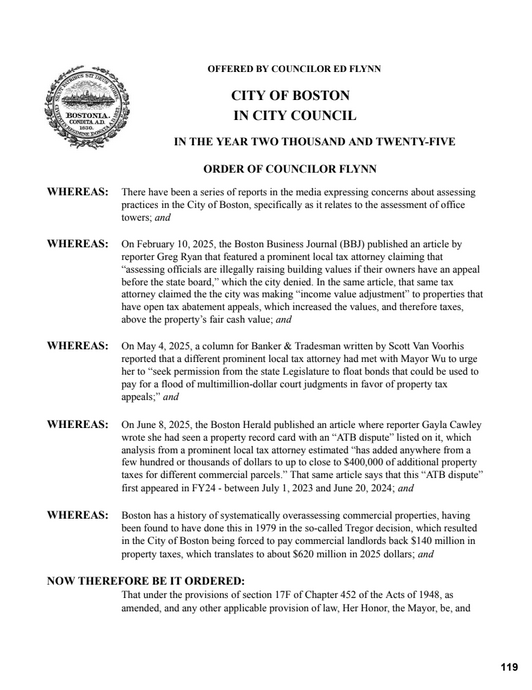
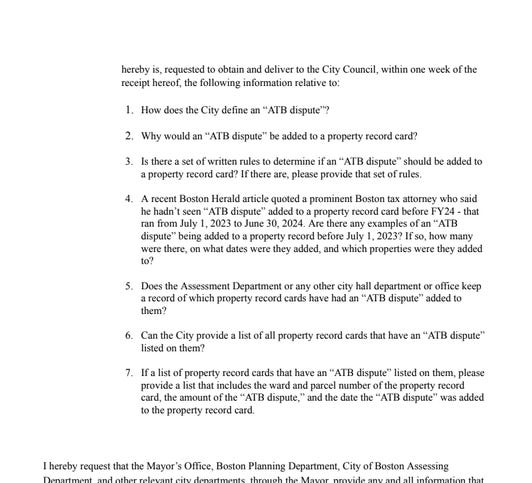
An attack on Boston Globe reporters covering Mass & Cass and the newspaper leadership’s response were both reported on this week, but not by the Globe itself. Instead, on Wednesday evening the Boston Guardian, a small community paper, reported that the Globe’s City Hall reporter Niki Griswold and photographer Barry Chin, along with several community members, were assaulted while visiting Mass & Cass. Then later on Thursday Northeastern University journalism professor Dan Kennedy posted the note that the Globe’s editor Nancy Barnes sent to staff, which floated the idea of requiring security for any staff visiting Mass & Cass;
On Thursday at a hearing organized and chaired by Councilor-at-Large Julia Mejia the Boston public got to see the pro and con arguments be made about the recently awarded civilian flagger contract, an issue first brought to light thanks to Yawu Miller’s article about the contract in Flipside News, with City Hall defending the process - Boston’s Purchasing Agent Casey Brock-Wilson is Speaker 3 & starts at the 1:10:30 mark in the transcript - and the most outspoken critic of the process, former Boston Police officer & MAMELO President Larry Ellison, laying out his wide-ranging criticism - he is Speaker 10 & starts at the 1:53:08 mark;
Thursday afternoon’s hearing highlighted that Councilor Mejia is one of the few Councilors who has held substantive hearings in the 24-25 term, with many of her colleagues who chair bolder face committees failing to hold hearings on a growing list of dockets about issues from bike & bus lanes to BPS school closure plans.
Keep reading for a comparison of this week’s poll results to the results from polls conducted by the same pollster in Boston for the 2021 Mayors race.
HOW MUCH DIFFERENCE DOES 4 YEARS MAKE?
While the Mayor’s race has captured the headlines, this week’s poll from the Boston Globe also asked about a number of non-mayoral policy questions. Those results not only provides some interesting insight into where Bostonians stand now, but can also be compared to polls conducted in the 2021 mayors race by same pollster, showing where the City’s residents might be changing their minds.
Here is what a comparison of the policy batteries in 2021 vs 2025 show:
Housing went from sharing the top spot with education to standing alone as the most important issue, increasing in importance from around 19-20% in 2021 to 26.00% in 2025;
Schools fell out of the top spot and all the way down to 3rd, dropping from 17.80%-20.20% in 2021 to 12.60% in 2025;
Racism/justice/equality also decreased significantly from 15.60%-19.20% in 2021 to 4.80% in 2025;
Crime saw a big decrease in importance as well, dropping from around 10-11% in 2021 to 5.60% in 2025;
Economy/jobs increased in importance from around 14% in 2021 to 17.20% in 2025;
Police reform decreased in importance from 3.80%-6.60% in 2021 to 1.20% in 2025;
Three big issues in the 2025 poll - Transportation (6.80%), Immigration (3.20%), and Local response to Trump initiatives (13.00%) - were not included in the 2021 battery. The lack of a transportation question in 2021 is disappointing, because that issue stood out as one that has seen significant movement over the past year: respondents rated it as a “high importance/low performance” issue in BPI’s April 2024 poll, and the Boston-focused poll from Emerson in February 2025 showed those numbers had significantly improved. That tracks with news about MBTA service improvements under GM Phil Eng.
Going into the more specific policy questions, there are a few places where the 2021 and 2025 polls ask similar questions. The most interesting was housing, which had a housing construction and a rent control question asked in both 2021 and 2025:
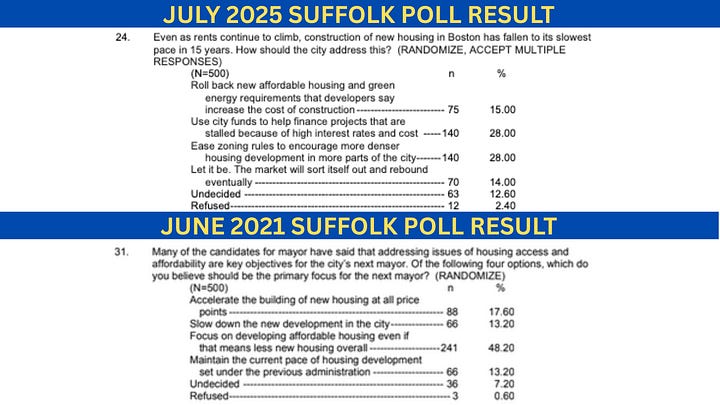
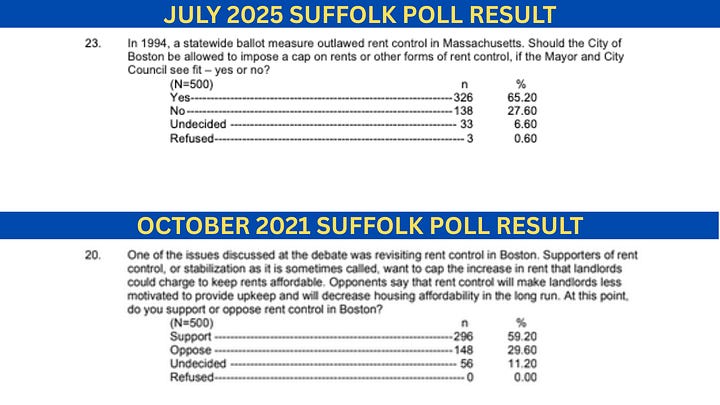
Exactly what is responsible for rent control increased support isn’t clear. On one hand, in 2025 the pollster didn’t make the anti-rent control argument they did in 2021. On the other hand, increased support for rent control tracks with housing becoming the single most important issue for respondents.
Much bigger than the rent control changes is the enormous growth in support for more housing construction between 2021 and 2025:
In 2021 just 17% of respondents wanted to accelerate construction at all price points, with another 13% who wanted to maintain the current pace vs 48% of respondents supported “focus on developing affordable housing even if that means less new housing overall,” with another 13% wanting to just “slow down new development in the city;”
In 2025 those numbers have flipped, with 28% want to “ease zoning rules to encourage more denser housing development,” another 15% in favor of rolling back rules “developers say increase the cost of construction,” and 28% supporting using “city funds to help finance projects that are stalled;”
Unfortunately in 2025 there is no parallels the 2021 option “slow down new development in the city,” so the amount of open NIMBY sentiment, and where those respondents fall on other issues, isn’t available.
The other specific issue questions asked in both 2021 and 2025 were around policing. While the 2025 poll had fewer questions about policing & public safety questions than the 2021 polls, there were still a few questions this year, allowing for some comparisons to be made:
The July 2025 poll showed 52.20% of respondents supported “cutting some funding from the police and using the money for social services – for instance, to help the homeless and the mentally ill,” similar to the 56.20% who preferred reallocating funding in the Oct 2021 poll;
In July 2025 perceptions of police appeared to improve, with more respondents saying police were doing a good job - 53.20% in 2021 vs 66.00% in 2025 - and fewer saying they were racist - 35.80% in 2021 vs 23.80% in 2025;
These numbers seem to reflect the fact that public safety and policing issues have become more complicated, with a record low murder rate happening at the same time Mass & Cass related disorder has appeared to increase, with the assault of Globe reporters & widely covered break-ins in the South End just this last week.
Here are all the policy-related questions from the July 2025 poll:
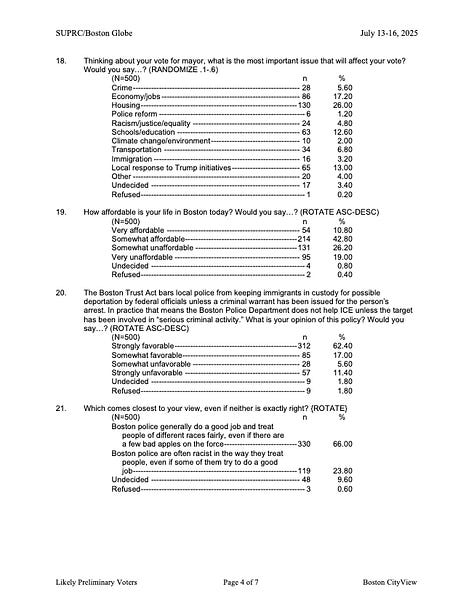
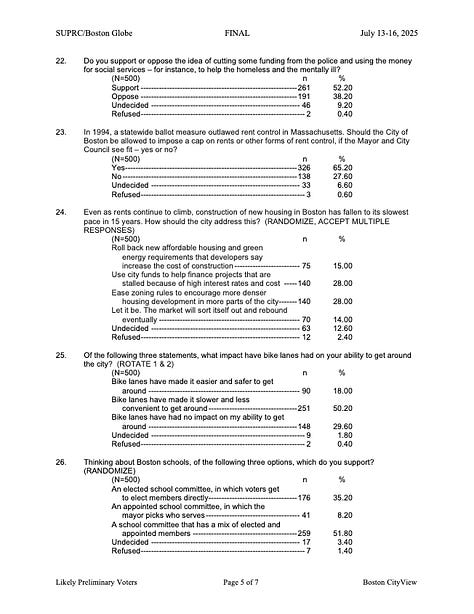

Check out the Globe’s whole poll here, and check out BPI’s poll from back in April 2024 here.
Boston Policy Institute, Inc is working to improve the public conversation - help us by following BPI on YouTube, TikTok, Facebook, Instagram, Threads, Twitter, and LinkedIn.





Thank you for correcting me. 15% drop in bps enrollment since 2013 might be the more relevant variable.
2021 might not be a great comparison on the issue of schools because of the combination of exam school admission changes and Covid closures were very fresh. Today we are back to a pre-Covid world (with even fewer Boston families with kids in public).